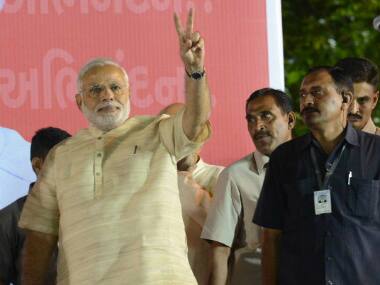The Delhi defeat seems to have triggered a strong churning for Prime Minister Narendra Modi who looks set to turn a new leaf and reinvent himself as a secular, visionary statesman – not a hardcore Hindu fundamentalist leader that most people within India and the world believe him to be. Or else how does one explain PM Modi summoning Delhi Police Commissioner BS Bassi and instructing him to investigate recent incidents of “vandalism”? [caption id=“attachment_2099469” align=“alignleft” width=“380” class=" “]  Prime Minister Narendra Modi. Reuters[/caption] Modi summoned Delhi Police chief – a job which could well have been done by his home minister Rajnath Singh but he chose to do it himself – mainly against the backdrop of rising incidents of vandalism against the Christian community in Delhi. Six cases of vandalism directed against Christians have thus far been reported from Delhi, the last one having taken place on 13 February in a convent school where HRD Minister Smriti Irani had studied. Modi’s purported image make-over signals a massive shift in his stated ideology close on the heels of a rap on his knuckles twice by none other United States President Barack Obama – first on the last day of his India trip and then a few days later from the American soil. Also, Modi’s unusual summoning of the Delhi Police chief over rising cases of vandalism against Delhi’s Christian community comes at a time when he is expected to visit four countries within the next four months. The Prime Minister would be visiting Germany and France in April and China in May. All these would be bilateral visits. In June, PM Modi would be visiting Russia for attending the BRICS summit, a multilateral event. Modi meeting Delhi Police Commissioner may well signify a radical change in his approach towards the minorities. He may not be reinventing the wheel but he is definitely reinventing himself and his image. A brief press release from the PMO on Modi’s meeting with BS Bassi on 13 February does not specifically mention the Christian community or vandalism of Christian assets, including churches. But the message is clear. Sample the PMO press release.
“The Prime Minister, Shri Narendra Modi, today summoned the Police Commissioner of Delhi, Shri B S Bassi, and expressed his deep concern and anguish over the rising crime rate in the Capital. The Prime Minister asked the Police Commissioner to speedily investigate the recent incidents of vandalism and ensure that the guilty are brought to book. The Prime Minister also spoke over telephone to the Union Home Secretary, Shri L.C. Goyal. The Prime Minister asked the Home Secretary to pay special attention to the rising incidents of crime, and vandalism, and to work towards ensuring the safety and security of women in the Capital.”
Significantly, PM Modi’s silence was deafening when churches in Delhi were being vandalized. That was the time when Delhi assembly elections were yet to take place and Delhi was in a campaign mode. Modi’s summoning of the Delhi Police Commissioner occurred only after the BJP got its worst drubbing in Delhi assembly polls. Suddenly you have PM Modi who is now signaling zero-tolerance to violent attacks on the minorities. This seems to be a part of a well thought-out strategy wherein he is donning the mantle of a no-nonsense secular leader. Is this Modi 2.0? Well, one will have to wait and watch. After all, he has not said a word since his American friend “Barack” twice reminded him about the importance of religious tolerance. But this could be his well thought-out answer and approach to the issues flagged by President Obama. But this is a mined road that PM Modi may be wishing to tread. His benefactor LK Advani had tried his hands in this change-of-heart strategy by saluting a “secular” Mohammed Ali Jinnah, Father of Nation for Pakistan in June 2005 from the Pakistani soil. Incidentally, Adavni’s game-changer politics had come about during a visit to Jinnah’s tomb in Karachi and praised the man he was accused of plotting to murder six decades ago. But when Advani made his famous remarks on Jinnah from the Pakistani soil he was in the opposition. The experiment proved disastrous and Advani fell from grace within the BJP and the RSS since then and was eventually marginalized. In contrast, Modi’s purported transition to secularism is taking place at a time not only when he is the Prime Minister but also the sole undisputed leader of the BJP. Here he enjoys an advantage over Advani. The question, however, is whether Modi would be able to take along his party and the Sangh Parivar as he projects himself as a secular leader? Coming weeks and months should provide greater clarity in this regard.


)

)
)
)
)
)
)
)
)



